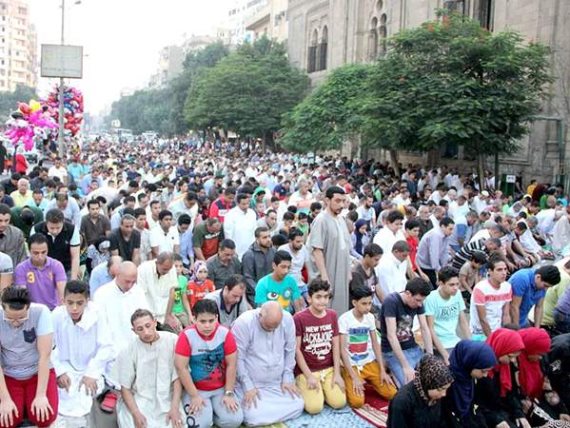Ramadan is a time of fasting, self-restraint, and good deeds. It is also an occasion for storytelling, either in celebration of the nightly feast or as a way to pass the time. In the spirit of the long days and longer nights of Ramadan, Al-Masry Al-Youm shares stories and tips for a good month in a new series called “Alf Leila We Leila: Stories for Ramadan Through the Ages.” Throughout the holy month, we will post original pieces from the Al-Masry Al-Youm staff on everything from how to host a perfect iftar to the five senses of the season, alongside Arabic literature from Sheherazade to Mahfouz.
Below, translator Dina Zafer recalls the challenges of Ramadan in August, with its surplus of traffic and lack of power and water.
This year, Ramadan is in August. And it will continue to be in the summer until 2018. That’s good news for me; the more difficult the fasting, the greater the reward from God. But is this good news for the Egyptian government?
Cairo traffic is already notorious, and it gets worse during Ramadan, when almost every hour is rush hour. Still, on my way back from work during the first week of Ramadan, I was optimistic, having heard many officials reiterate that this year they ensure smooth-flowing traffic during Ramadan.
I hopped into the car and merged into traffic. Little did I know that I would emerge a full two hours later. The traffic in Tahrir Square was motionless.
Keeping my chin up, I switched on the radio. “Traffic is congested on major bridges and roads,” said the voice of a traffic expert speaking on the radio.
Really? As if I don’t know that already. I muted the radio.
By now disillusioned, I grabbed the newspaper from the seat next to me and spread it out open on the steering wheel. I notice a policeman staring at me in the distance.
Reading in the car is not a traffic offense… or is it?
I looked up occasionally in the hopes of spotting any change in the pattern of cars, but they stayed perfectly stationary.
By the time I finished reading one of the opinion articles in Al-Masry Al-Youm, I began to see the car in front of me hesitantly moving forward. Like unleashed beasts, the cars scrambled to fill any empty space that opened up as the traffic lights turned green and the traffic cop gesticulated impatiently at the cars to move. I forced my way up the 6th October Bridge amidst the impatient engines and roaring car horns.
Home.
I made it just in time for iftar. Collapsing into my seat at the table, I quickly pulled some atayef and a piece of konafa onto my plate. As I prepared to polish off the food and gulp down the irresistibly frosty amar al-din, the lights went out.
I waited a couple of minutes at the table, hoping that the lights would come back on right away. Then, chagrined, I groped my way around the apartment to gather all the scattered candles.
A romantic candlelit iftar. That’s quite original.
The government had already been implementing an ingenious power-saving plan that involved turning off every other lamppost in the streets. I hadn’t known, however, that the government had also decided to systematically switch off the lights and air conditioning units in our homes during this sweltering summer.
It suddenly dawned on me. Aha, is this the rolling blackouts policy I read about in the papers this morning? It must be our turn to suffer then. Were these blackouts intentionally engineered to coincide with iftar?
I told myself to stop being so mean. The electricity company definitely did not mean to spoil my iftar.
An hour or so later, the power was back.
I switched on the TV, which, like every year, presents a mishmash of dull sitcoms, botched shows, and tedious serials. Amidst this mayhem of Ramadan productions, I tried to find a decent program to watch, and eventually stumbled upon one of those rare talk shows to survive during Ramadan.
“The residents of many districts in Cairo were out of electricity today,” reported a sympathetic TV presenter.
Perfectly timed power cuts! I wanted to add.
“The residents of New Cairo also suffered water cuts due to the rupture of main pipes feeding the area,” said the presenter, now sounding heartbroken.
New Cairo? We have some relatives there, don’t we?
“The residents of these areas are staying at their relatives homes, or appealing to them to bring water,” added the presenter.
The phone started ringing.
Who could possibly be calling at this hour? At this point I was already struggling to keep my eyes open.
I glanced at the caller ID screen; it was my cousin in al-Rehab. I reached for the phone, then recoiled in fear.
Al-Rehab? New Cairo?
I hesitated to answer.




